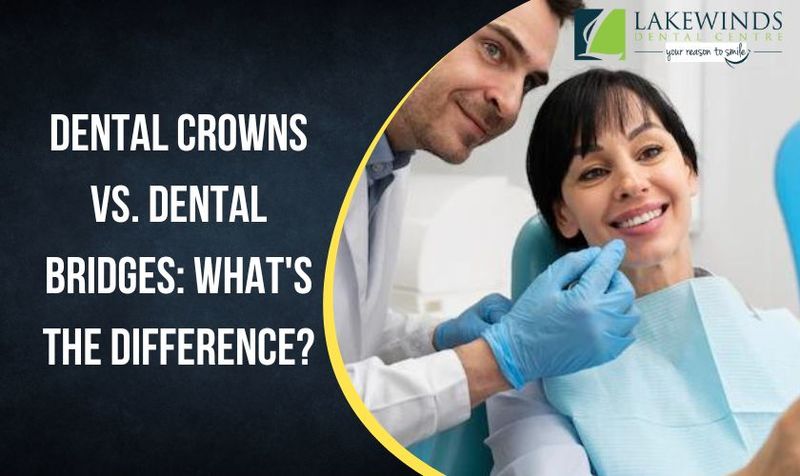Dental bridges and crowns are two common dental treatments that can help preserve your teeth and improve the appearance of your smile. Knowing the difference between a bridge and a crown will help you understand which treatment is right for you. This article will discuss what a dental bridge and crown are when they might be necessary, and how they differ.
Dental Bridges & Crowns
A dental bridge is a fixed prosthetic device that replaces one or more missing teeth. The bridge consists of two or more artificial teeth – called pontics – connected by either natural-looking false tooth structures or metal frames. A dental crown is an artificial “cap” placed over a damaged or decayed tooth. The crown is designed to restore the damaged tooth’s strength, structure, and function.
When are Dental Bridges and Crowns Necessary?
Dental bridges may be necessary to replace a missing tooth to maintain proper tooth alignment and bite force distribution throughout your mouth. They may also fill in gaps between teeth caused by trauma, disease, or decay.
A dental crown can help protect an already weakened or cracked tooth from further damage. It may also be used as part of a root canal procedure or for cosmetic purposes such as reshaping a misshapen or discolored tooth.
What is the Difference Between Dental Bridges and Dental Crowns?
The most obvious difference between a bridge and a crown is the way they’re used. A bridge replaces missing teeth, while a crown helps to protect existing teeth. The materials used to make bridges and crowns are also different. Bridges are typically made from porcelain or ceramic fused to metal frameworks, while crowns can be made from porcelain, ceramic, gold, or other metals.
Additionally, bridges are usually fixed in place using special cement or bonding material, while crowns may be secured with either dental adhesives or metal posts and screws. Finally, bridges require more preparation than crowns and may take several visits.
Benefits of Dental Bridges & Crowns
Having a bridge or crown fitted can help protect the surrounding teeth from future damage, improve your bite and chewing abilities, restore your smile, and prevent further tooth decay. Bridges and crowns can also help improve speech if you miss teeth.
FAQs
- What is the difference between a dental bridge and a dental crown?
A dental bridge replaces one or more missing teeth, while a dental crown helps to protect existing teeth from further damage. The materials used to make bridges and crowns are also different – bridges are typically made from porcelain or ceramic fused to metal frameworks, while crowns may be made from porcelain, ceramic, gold, or other metals.
- Are dental bridges and crowns permanent?
Dental bridges are typically fixed in place using special cement or bonding material, while crowns may be secured with either dental adhesives or metal posts and screws. Bridges require more preparation than crowns and may take several visits.
- What are the benefits of having a bridge or crown fitted?
Having a bridge or crown fitted can help protect the surrounding teeth from future damage, improve your bite and chewing abilities, restore your smile, and prevent further tooth decay. Bridges and crowns can also help improve speech if you miss teeth.
Conclusion
Dental bridges and crowns are two common treatments that can help preserve your teeth and protect them from future damage. Bridges are typically used to replace missing teeth, while crowns help to protect existing teeth from further decay or trauma. Both treatments offer various benefits and can help restore your smile and improve your bite. Before having either a bridge or crown fitted, consult with a qualified dental professional to determine the best course of treatment for you.












